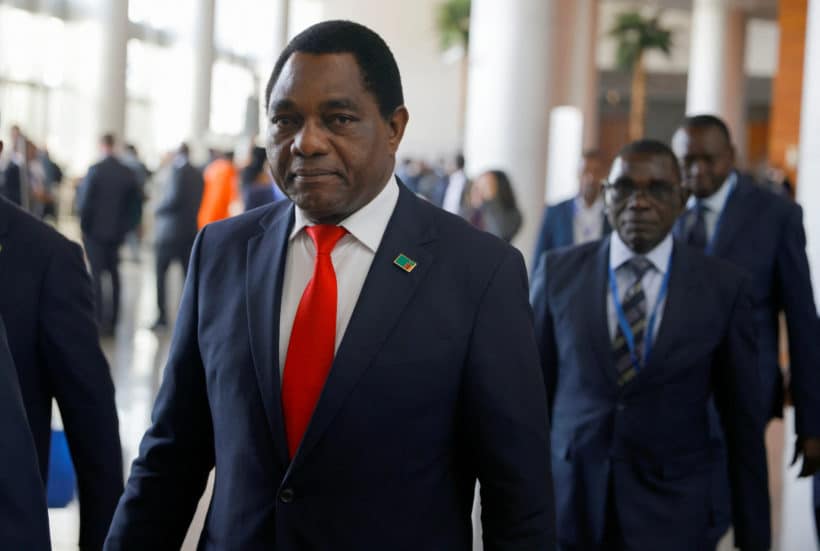
PARIS, June 23 (Reuters) – Zambia has struck a deal to restructure $6.3 billion in debt owed to other governments, including China, marking a long-awaited breakthrough for indebted nations around the world that have faced lengthy negotiations with creditors.
Zambia in 2020 became the first African country to default on its sovereign debt during the COVID-19 pandemic and struggled since then in protracted discussions to agree a deal.
“Zambia has reached an agreement on a debt treatment with our official creditors – a significant milestone in our journey towards economic recovery & growth,” Zambian President Hakainde Hichilema said on Twitter.
The agreement calls for Zambia’s debt to be rescheduled over more than 20 years with a three-year grace period during which only payments on interest are due. China is the largest official creditor to Zambia.
The debt earmarked for restructuring includes $1.3 billion in arrears, and private sector creditors are expected to do the same on the $6.8 billion owed to them, according to a French official who did not wish to be identified.
Zambia is viewed as a test case for a debt restructuring framework backed by the Group of 20 wealthy nations intended to streamline relief for countries caught in a developing world debt crisis sparked in part by the pandemic.
However, the process has been achingly slow for Zambia, a fact that has discouraged all but a handful of other struggling governments from seeking help under the mechanism.
Beijing was keen not to be seen further holding up debt relief for Zambia at the summit, the French official said, adding that French President Emmanuel Macron’s talks with Chinese authorities in Beijing in April also helped unblock the situation.
Macron said on Twitter the debt restructuring deal was “a historic achievement”.
“We remain mobilised to ensure that other countries caught in debt trap benefit from a multilateral response,” Macron added.
The restructuring agreement with official creditors paves the way for Zambia to receive another $188 million tranche of money from the International Monetary Fund, part of a $1.3 billion package approved in August 2022.
“This agreement paves the way for the completion of the first review of Zambia’s three-year Extended Credit Facility Arrangement, which is helping put Zambia on a path toward sustainable economic growth and poverty reduction,” Kristalina Georgieva, managing director of the International Monetary Fund, said in a written statement.
The scale of the debt relief Zambia requires has been a concern for some of the country’s main creditors.
Some Western officials have accused China – Zambia’s largest bilateral creditor – of dragging its feet in restructuring talks, something Beijing denies.
Of the $6.3 billion in debt owed to government bodies, $4.1 billion was owed specifically to Export-Import Bank of China – which according to analysts underlined the significance of China’s support to the debt relief deal.
“I am pleased that the international community has come together to support Zambia in its time of need,” U.S. Treasury Secretary Janet Yellen said in a statement.
“I urge all official bilateral and private sector creditors to quickly finalise the debt restructuring process that will provide relief to Zambian families and encourage the private investment that is needed to jump start the economy.”
Zambia’s Hichilema was one of about 40 leaders attending a summit in France on Thursday and Friday aimed at easing the debt burden on some of the world’s most vulnerable countries while freeing up billions of dollars in new funds for climate finance.
Zambia’s international bonds broadly traded flat on Friday but have rallied in recent months, with the 2024 issue hitting a nine month high in early trade. XS1056386714=TE
(Reporting by Leigh Thomas; Additional reporting by Chris Mfula in Lusaka, Jorgelina do Rosario in London, Nellie Peyton in Johannesburg and Dan Whitcomb in Paris; Writing by Karin Strohecker, Editing by Deepa Babington and Susan Fenton)

